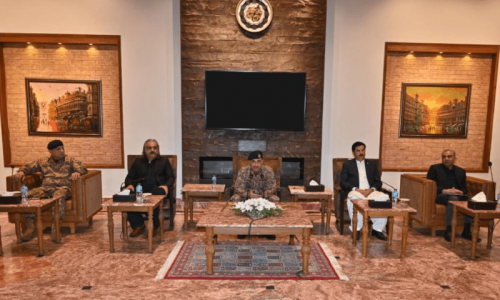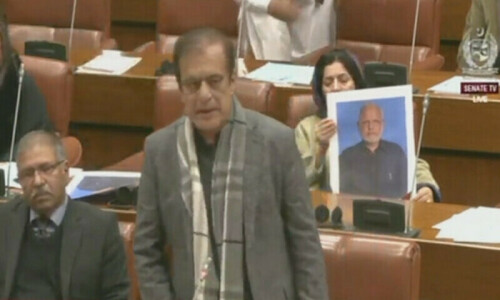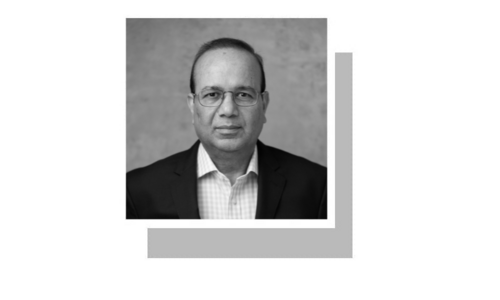NEW DELHI, Feb 24: US President George W. Bush has stressed the need for “citizens of Kashmir” to be included in talks about their fate going on between India and Pakistan, according to the White House version of his interview to two Indian newspapers published on Friday.
The landmark remarks were made in a “round table interview” President Bush gave in Washington on Wednesday to The Times of India and Hindi daily Dainik Bhaskar. However, The Times of India appeared to have left out the very comments that Mr Bush had sought to underscore, from the “full text” of the interview published on Friday.
President Bush made what he said was a “quick statement” to kick off the interview. His first point dealt with his affection for Indian Prime Minister Manmohan Singh and how much the president and his wife looked forward to the visit starting March 1. This part was carried in the Times version, but the following was not: “I do want to make something clear in the speech I gave today (to Asia Society). I said that — as to the Kashmir interest — issue, America supports a solution that is acceptable to all sides. As you might recall in my remarks, I said, “to both sides.” I would like the record to be so that the world hears me say, “all sides.” I fully understand that the deal has to be acceptable to the Indians, Pakistanis, as well as the citizens of Kashmir. Okay?”
The interviewer answered “yes” to that and then proffered his first Question: “Mr President, how and why has India come front and centre to US strategic thinking now after being on the margins for so many years?” End of Cold War was given as explanation.
The wide-ranging questions included issues from nuclear energy cooperation, Iran, to his interest in Hindi movies and cricket, but seemed to studiously avoid ties with Pakistan other than a query as to why the Americans had not quizzed Mr A.Q. Khan.
On A.Q. Khan, Mr Bush replied, “Well, we were the nation that exposed the conspiracy to deal with — more than the conspiracy, the activities, let me rephrase that — we were the nation that exposed the activities of sharing technologies, sensitive technologies, nuclear weapons-related technologies. And we, of course, want to know as much about the A.Q. Khan network as possible. But had it not been for US intelligence, coupled with British intelligence, this network never would have been exposed. And the light of day helps understand proliferation.”
His remarks on India-Pakistan ties in response to an unrelated question, the president’s keenness to make a point on an issue of high importance regardless even though he was not asked to comment. That question was if he would allow more Indians to work in the United States. The answer was yes but the rider was even more emphatic. “And likewise, I would hope that India would lift its investment caps,” he replied. “In other words — and part of the trip is to kind of work on ways to continue to develop this strategic relationship in a constructive way. It’s a — you know, I said something interesting — at least I thought it was interesting — in the speech. I said, for a period of time, if you’re a friend of Pakistan, you couldn’t deal with India, and if you’re a friend of India, you couldn’t deal with Pakistan. And we have tried to change the relationships so that people recognise it’s in their interest that the United States is a friend of Pakistan, and people in Pakistan recognise it’s in their interest that the United States is a friend of India’s to help, if need be, reduce tensions.
“Right now, the level of tensions are, relatively speaking, down. I can remember when I first came into office. You might remember there was a series of incidents that got everybody quite nervous, and we had shuttle diplomacy — Colin Powell. And it seems to me that there is a renewed commitment to resolving problems. I thought it was very interesting that trade between the two countries has doubled, that there’s, you know, new transportation hubs. That’s all very positive in terms of resolving issues.
“You asked me about the relationship, how it’s evolved, and I mentioned to you that as time passes sometimes, and circumstances change, relationships are able to develop a new dynamic. I would hope that time and circumstantial change is enabling India and Pakistan to develop a new dynamic. It appears to be that way.”















































Dear visitor, the comments section is undergoing an overhaul and will return soon.